- Home
- Jill Eileen Smith
The Shepherdess
The Shepherdess Read online
© 2015 by Jill Eileen Smith
Published by Revell
a division of Baker Publishing Group
P.O. Box 6287, Grand Rapids, MI 49516-6287
www.revellbooks.com
All rights reserved. No part of this publication may be reproduced, stored in a retrieval system, or transmitted in any form or by any means—for example, electronic, photocopy, recording—without the prior written permission of the publisher. The only exception is brief quotations in printed reviews.
ISBN 978-1-4412-2339-5
Scripture quotations are from The Holy Bible, English Standard Version® (ESV®), copyright © 2001 by Crossway, a publishing ministry of Good News Publishers. Used by permission. All rights reserved. ESV Text Edition: 2007
This is a work of historical reconstruction; the appearances of certain historical figures are therefore inevitable. All other characters, however, are products of the author’s imagination, and any resemblance to actual persons, living or dead, is coincidental.
Published in association with the Books & Such Literary Agency, Wendy Lawton, Central Valley Office, P.O. Box 1227, Hilmar, CA 95324, [email protected]
To Kathy K., Kathy K., Kathy R., Joyce, Sue, Jud, Robin, Linda—longtime, dear friends.
I hope you all know how much you mean to me.
This one is for you.
Contents
Cover
Title Page
Copyright Page
Dedication
Epigraph
Prelude
1
2
3
Interlude
4
5
6
7
8
9
10
Postlude
Note to the Reader
Acknowledgments
About the Author
Books by Jill Eileen Smith
Back Ads
Back Cover
Now King David was old and advanced in years. And although they covered him with clothes, he could not get warm. Therefore his servants said to him, “Let a young woman be sought for my lord the king, and let her wait on the king and be in his service. Let her lie in your arms, that my lord the king may be warm.” So they sought for a beautiful young woman throughout all the territory of Israel, and found Abishag the Shunammite, and brought her to the king. The young woman was very beautiful, and she was of service to the king and attended to him, but the king knew her not.
1 Kings 1:1–4
Prelude
I wonder if anyone really lives the life they expect. Do the very old among us look back and think, This isn’t what I envisioned? Or wish they could go back and live life again, but make different choices?
I think I have always pondered these and other unanswerable questions. Perhaps this was why my brothers were glad to be rid of me when they sent me to work the vineyards and tend the sheep after our parents passed from this earth. They were glad enough to be truly rid of me when the king’s men came to our small town looking for beautiful women. They did not seem to find me so impossible or annoying then.
But why did the king’s men think me beautiful? Did they not notice my darkened skin, tanned beneath the sun’s rays? I was nearly as black as a Nubian! My sisters-in-law faulted me for the color of my skin and they were right, for I often lifted my veil and ran with it sailing behind me in the wind. I danced among the grasses. I chased imaginary dreams through the barley fields. And I sang. Oh how I loved to sing to the small flock sometimes put in my care.
But my singing nearly ended the day the king’s men took me from my beloved fields to enter a walled palace of cedar. Gone were my carefree thoughts and the tasks my brothers assigned me. Gone the daydreams of a young woman in love with the shepherd over the hill.
My life had become the exact opposite of all I expected.
1
973 BC
“Abishag, what are you still doing in this house?” My sister-in-law Batya leveled her narrow gaze at me in that telltale angry look she had.
I glanced up from the bowl where I had rinsed the last of the pomegranate juice and met her brittle stare.
“Dekel will not be happy when I tell him that you wasted the entire day sitting around here doing nothing.” She pushed her hands toward me as if to rid the world of my presence. “Now get out to the fields and check on those silly sheep of yours before I tell him what a worthless sister he has.”
To argue with Batya would get me nowhere, despite the fact that I had spent the day doing her work, breaking pomegranates apart until my fingers were stained beyond hope and grinding grain until they formed new calluses. She would forget her harping and the work she had assigned me in her sudden need to turn me out as though I were a ruined garment.
The familiar ache formed, first a knot in my middle, then probing deeper into the place where my thoughts lived. Why? I searched my mind as I half stumbled past my quarreling nieces and nephews, who should have been working with their fathers in the fields. This house used to be my home, my father’s house, where I once felt safe, comforted.
But my oldest brother, Dekel, owned it now since my father’s untimely death, and had offered shelter to the rest of us, though I, as the youngest and only girl, did not fare as well as my brothers, Eitan and Haim. And once my mother also passed, it was as though he had forgotten I still lived. Had I done something to bring him shame? Had I said unkind words to cause my sisters-in-law, particularly Batya, to wound me with their sharp tongues?
The thoughts churned until even the recent taste of the pomegranate juice lost its sweet savor. I hurried through our courtyard, past the houses of other Shunammite villagers, and fairly ran to the common pens where Dekel allowed me to keep a small flock.
My breath came fast as I breathed the scents of animal and earth and felt the last vestiges of sunshine and the wind’s gentle touch on my cheeks. A sigh escaped me, and with it the slightest sting of tears. I swiped at them as I lifted my gaze toward the hills where the sheep waited. I would not cry. I had spent my tears at my mother’s death, but, in the years since, dared not give in to such emotion again. I gained nothing but ridicule from such honest weakness.
The reminder lifted my determination, and I stopped, drinking in the scents and sounds around me. Ewes bleated at my approach, and as I tilted my head, my ears caught the music of a variety of birds singing their evening songs.
I came to the pens and unlatched the gate, quickly calling the sheep to me. They lifted their narrow faces with their floppy pointed ears and greeted me with their own distinct baas. I laughed. “What silly creatures you are.” I patted the head of each one as they came and followed me in our traditional dance toward the well at the bottom of the hill. They were silly, but not in the way Batya exclaimed. In the way they sang their greetings to me. And in the way my heart responded in kind.
The ache I had grown so accustomed to slowly dissipated as we descended the hill. I pulled the scarf from my head and let it blow in the breeze behind me. I would survive. And someday I would marry and move away from this place and show my brothers, and more particularly my sisters-in-law, that I was not worthy of their scorn. Adonai, who had created my inmost being, surely cared for me, despite how lowly I appeared in their eyes.
As we approached the well, I saw with relief that the stone still sat angled to the side. But I slowed my pace at the sight of village women standing in groups, water jugs atop their heads and no doubt bitter words spilling from their tongues. I endured enough faultfinding from Batya and Galia. I had no need to hear of the latest betrothal or woman about to give birth, or a complaint that the sun was too hot or too hidden. Such conversations wearied me.
I shook myself
, reminded of the sheep, and turned my attention to making sure they did not stray. We drew closer to the troughs, careful to skirt around the gathered women.
“There you are.” I stiffened at the voice of my niece Lilach, Galia’s oldest daughter, and looked up to see her striding toward me, her jar perfectly balanced, her hips swaying in a manner that caused most men to turn their heads. I imagined how often she must practice such flirtation when no one was around to notice.
She stopped close to me. “I expected you in the vineyards or fields before sunup, not when it is almost time to prepare the evening meal.”
I studied Lilach, this niece who shared my brother Eitan’s crooked nose but had hair darker than mine. She did not smile as easily as her mother, but she did not seem to mind my company as much as my brothers’ wives did.
“I expected to be here as well. Batya kept me working in the cooking rooms all day.” I showed Lilach the stains from the pomegranate juice on my fingers. “We have enough seeds to make wine to last all winter.” It was a job I detested, though I will admit I did like the taste of the juice when the seeds were crushed. I often sneaked several seeds into my mouth when Batya and Galia weren’t looking. Sometimes Kelila, my third sister-in-law, took my side against them, but not today.
“Well, you missed Yaron,” Lilach said with the slightest gleam of triumph in her dark gaze. “He took his sheep to pasture long ago and said he won’t be back for several days.”
“You saw him this morning?”
“On my way to the well.” Lilach looked down her long nose at me. “If you had come with me, you could have spoken to him.” She scowled as though she were truly disappointed I had missed him. But a moment later she shrugged. “He did not ask about you, if that’s what you were wondering.”
I was wondering, but I shook my head. “Of course not.” I hated myself for lying to her, but I had learned to hold my thoughts close in times such as these. Lilach had sensed my interest in the young shepherd. And Yaron himself seemed to accept my smile, even friendship, on the few occasions we had spoken at the village pens. But he did not pursue me at the wine treading. And he had yet to ask his father to seek a woman’s hand in marriage. My heart did a little flip as I briefly closed my eyes to imagine his kind face.
“Well, I should get this to Ima before she wonders what happened to me.”
I looked at her and nodded, feeling the heat creep up my neck. Had she noticed my distraction? No doubt, by the way she lifted a brow, her look telling. She swept past me, and I could hear her chuckle. Despite her lack of beauty, Lilach always managed to be surrounded by young men. Though she was younger than I, I had no illusions to think I would marry before she did. Even Yaron had seemed taken with her at times. Was I so lacking that I had become invisible?
I shook myself, lest the sadness turn my heart as bitter as the village women, as bitter as Batya. It did not matter what Lilach did or did not do. It did not matter that young men found her laughter charming, while I could not bring myself to laugh freely. Freedom came to me in the hills with the sheep or in the vineyards where the birds sang the music of the heavens in my ear. Freedom and peace were not in the halls of Dekel’s household, where my many nieces and nephews caused enough noise to rumble the walls around us. Dekel made a nightly practice of bellowing for their silence.
When I married, I would not live in such a house of clamor. I would show worth to those under my roof, and I would set a table of peace for my husband.
I never tired of dreaming of such moments.
The sun dipped quickly once the sheep were watered and allowed to feed in a neighboring field. I glanced skyward at the full moon, grateful for its light. I had no torch to guide my way, and the sheep could too easily wander from me if I took them farther afield and sought shelter for them in a cave, despite my desire to do so, to escape for an evening. But it was too late to seek time in the hills, so I soon gathered them around me again and led them back to the pens.
There was little to inspect of their skin before bedding them down, as we had not gone far enough to encounter brambles, but still I lingered. I could sleep in the pen with the sheep if I were still a child with a loving father to watch over me. Staying alone after dark in the village could prove riskier for a maiden my age. I shuddered to consider some of the tales that my sisters-in-law had shared as we worked together to prepare a meal. I glanced about for the staff I had left in the pen in my haste to escape the village, and felt the sling tied to my belt and the stones that still lay within the pocket of my robe. I might be a virgin, an innocent, but I was not helpless.
The straw crunched beneath my bare feet, and I realized that I had once again forgotten my sandals. I glanced about, but there was no sign of the men returning with their flocks. They would find shelter in caves with roaring fires burning at the mouths to stave off the wolves and jackals. Was Yaron alone in such a cave? Did he think of me?
I allowed a small smile as I imagined his handsome face and the way his mouth crooked up just slightly at one corner beneath his short beard. He had come into manhood recently, and his beard was not yet as full as those of my brothers. But my heart had nearly stopped the day I saw him look at me and he did not immediately glance away. Why then did he not pursue me?
I closed the pen and scolded one of the ewes for dragging behind, then patted her head in apology. She was heavy with young, soon to give birth, after all. “Shall I sleep with you tonight?” I asked her, though I didn’t expect her to deliver for a few weeks to come.
She shook her head, but I took that to mean yes. I walked to the corner of the pen, shoveled some of the matted straw to the side and replaced it with fresh, then tamped it down again and sat with my back to the stone wall. Shadows hid me well here, but still my heart thumped too fast as I listened to the sounds of night descending and strained to hear the plod of footsteps or any hint that men walked about the town.
One of the lambs settled beside me, and I welcomed her company. I felt again the staff beside me and reminded myself that my foremother Rachel had been a shepherdess, as had many women since her day. I need not fear the men of my own town! Batya’s worrisome talk had started to penetrate my thoughts, and I chided myself for taking too much notice. I would not fear here in the sheep pens.
I glanced over my little flock, noting some of the restlessness among them. They had not liked being cooped up all day, and I had not given them nearly enough time to graze. Nor time to listen to my flute out in the hills. I cleared my throat and hummed a soft tune.
“Tell me, you whom I love, where you graze your flock and where you rest your sheep at midday.” Words formed, making a song. “Why should I be like a veiled woman beside the flocks of your friends?” I saw Yaron’s smile in my mind’s eye.
How long had I loved him? Did I love him?
“Someone has captured your thoughts for you to sing such words.”
The voice jolted me. I scrambled to my feet, startling one of the ewes. “Who is it?” I should have known better than to sing aloud here. At night.
“It is I, Yaron. We are practically cousins, Abishag. Don’t you know my voice by now?”
Yaron. My heart skipped a beat. “But Lilach said you had taken the sheep to the fields and would be gone several days. I did not expect you to return so soon.” Could he hear the waver in my tone, tell the way his voice had stirred my soul?
“One of the lambs has broken a leg. I left the flock with my brother to bring her back to tend.” It was then I noticed the lamb draped over his shoulders. He lifted it with ease to the sheep’s enclosure, and I walked toward the wall that separated us to get a closer look.
“May I help you?” I loved caring for those less fortunate, even if they were merely animals that would eventually be slaughtered for food or sacrifice.
He glanced at me, then looked back at the animal. “You can come and comfort her while I wrap the leg if you like.” He didn’t meet my gaze again, but I took him at his word. I made my way out of my s
heep pen, conscious of my bare feet over the prickly ground, and came to stand beside him.
I felt the heat of his presence, almost like we had touched, though there was a good arm’s length between us. I took my veil and spread it on the ground, kneeling on it beside the hurt ewe.
“You poor thing. What did you do to cause such an injury?” I ran my fingers through her soft wool.
“I rescued her from the jaws of a lion. She is fortunate to be alive.” Yaron spoke softly, his words matter-of-fact.
I did not react, lest he think me a silly female. I was a shepherdess in my own right. I knew what he meant, though I did give him a sharp glance to see if the encounter with the beast had caused him injury. “It is good that you were there to save her.” I breathed a sigh that he seemed to have come to no harm and stroked the animal’s head near her throat, feeling the rapid pulse beneath my touch. “It’s all right, little one. Yaron will fix your leg.”
“She lost much blood,” he said, pulling a length of linen from his pouch. I looked at the leg, noticing the blood seeping through where a bandage had already been wrapped.
“You will be all right,” I spoke to the lamb, silently praying the words were true. Needing them to be.
“Let’s hope so.” Yaron worked in silence then, adjusting the bone while I held the animal down—not an easy task. I sang softly, trying to blot out the sound of her pitiful bleats and her anguished cry when the bone was set. But at last it was done, and Yaron settled her on soft hay and sat beside her. A deep sigh escaped him.
“You’ve had a busy day,” I said, wishing I could say more to comfort him, knowing my words would mean little.
“No different than any other.” He removed his turban and shook the dust from his hair. “It was a grueling fight with the lion, despite the sling. Her leg was clamped in its teeth.”
The image was unsettling, and suddenly I did not want to speak of gruesome things. But I could not think of another thing to ask him that would not be overly personal, that I had no right to ask.

 Star of Persia: Esther's Story
Star of Persia: Esther's Story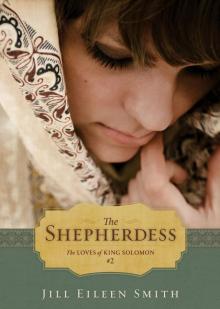 The Shepherdess
The Shepherdess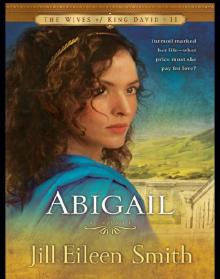 Abigail (The Wives of King David Book #2): A Novel
Abigail (The Wives of King David Book #2): A Novel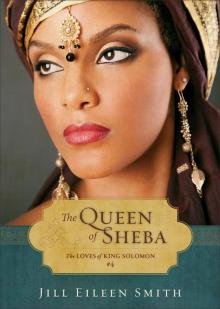 The Queen of Sheba
The Queen of Sheba Michal
Michal Rebekah
Rebekah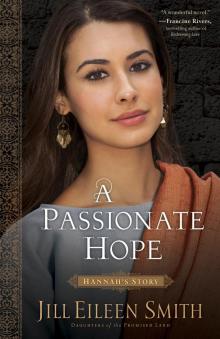 A Passionate Hope--Hannah's Story
A Passionate Hope--Hannah's Story Daughter of the Nile
Daughter of the Nile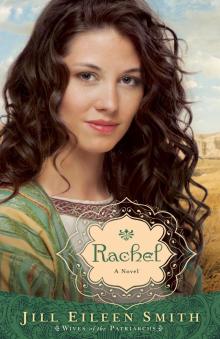 Rachel
Rachel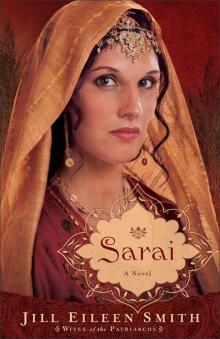 Sarai
Sarai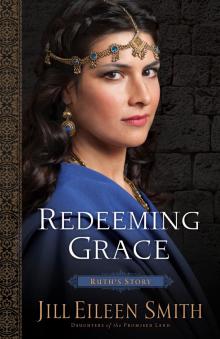 Redeeming Grace: Ruth's Story
Redeeming Grace: Ruth's Story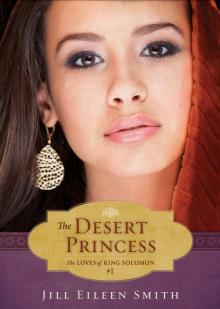 The Desert Princess
The Desert Princess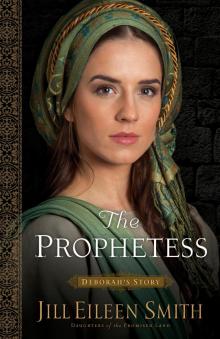 The Prophetess - Deborah's Story
The Prophetess - Deborah's Story